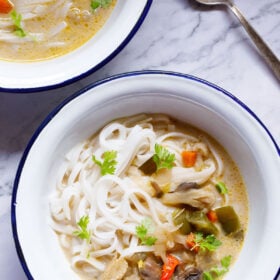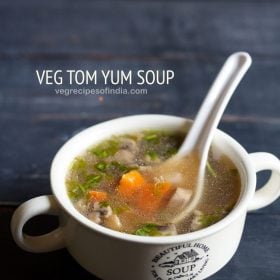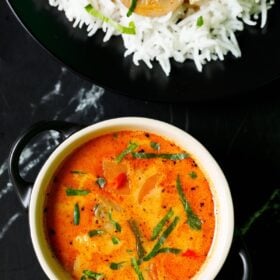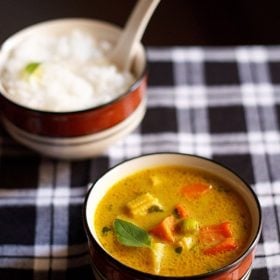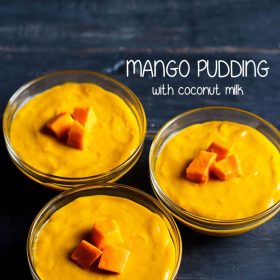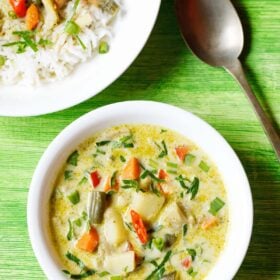My easy and authentic Thai Green Curry recipe is terrific for customizing with your favorite veggies and suitable for both vegetarians and vegans alike! Spicy hot and wonderfully saucy green curry is delicious to enjoy over rice for a satisfying plant-based meal. Here you’ll find step-by-step instructions with photos to prepare this restaurant-quality dish at home.
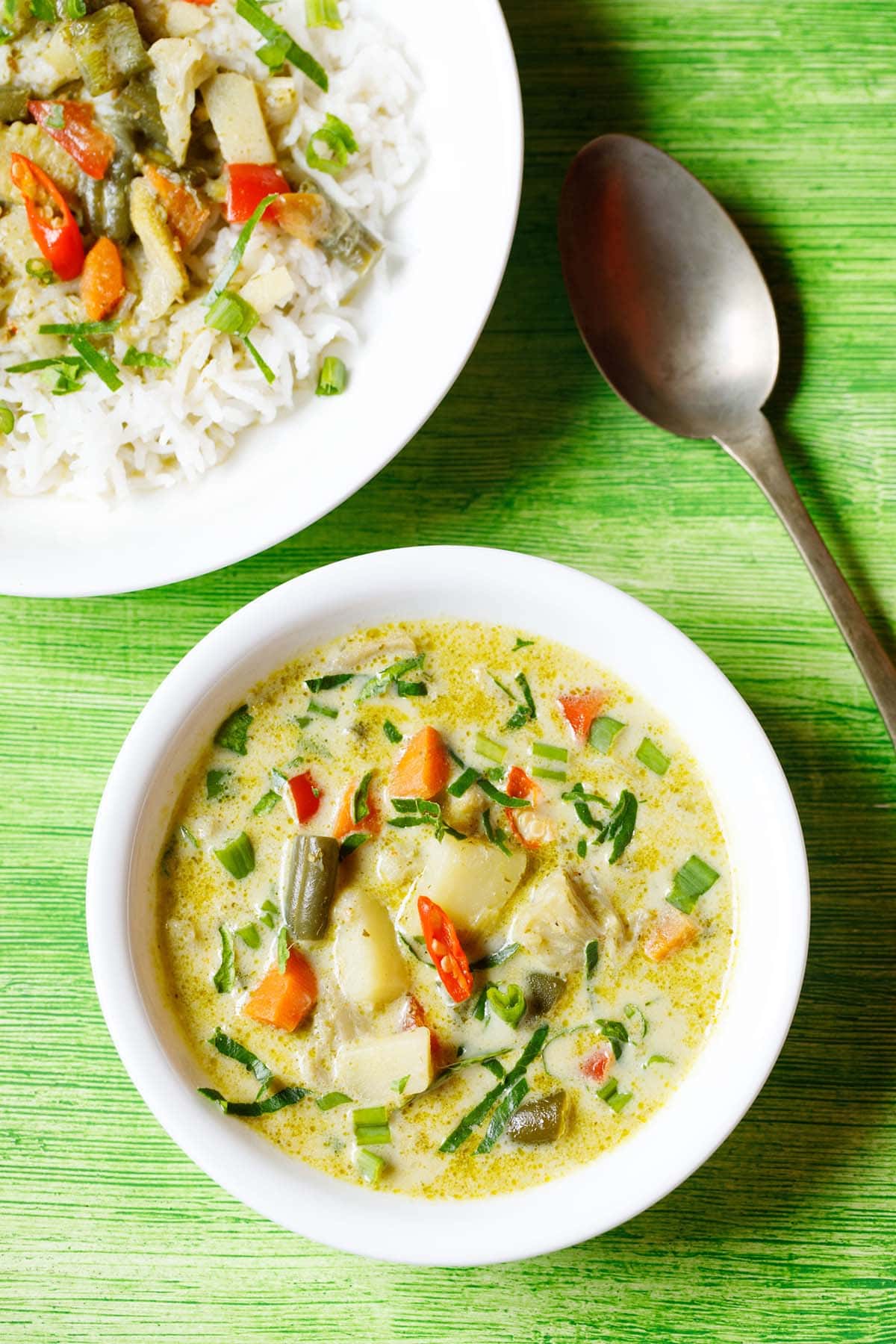
About Thai Green Curry
Traditional Thai green curry is made with a vibrant green curry paste, which typically includes fish sauce and shrimp paste to get just the right salty and umami flavors. However, I skip these ingredients and instead make my own homemade green curry paste with soy sauce and bold spices and herbs.
The result is a vegan version of green curry that still has the same wonderful taste as any authentic dish you’d find at your favorite Thai restaurant.
Making green curry paste from scratch allows for complete quality control and customization. (For instance, I like my curry to be particularly spicy, but you can easily tweak this recipe to make as hot as you prefer.)
Plus, green curry paste is great to prepare in a large batch and keep in the freezer – then you’ve got it ready to go whenever you need!
This Thai veg green curry recipe is a winner. I make it very frequently, so trust me when I say this recipe is tried-and-true!
Two other tasty Thai curry recipes I love are:
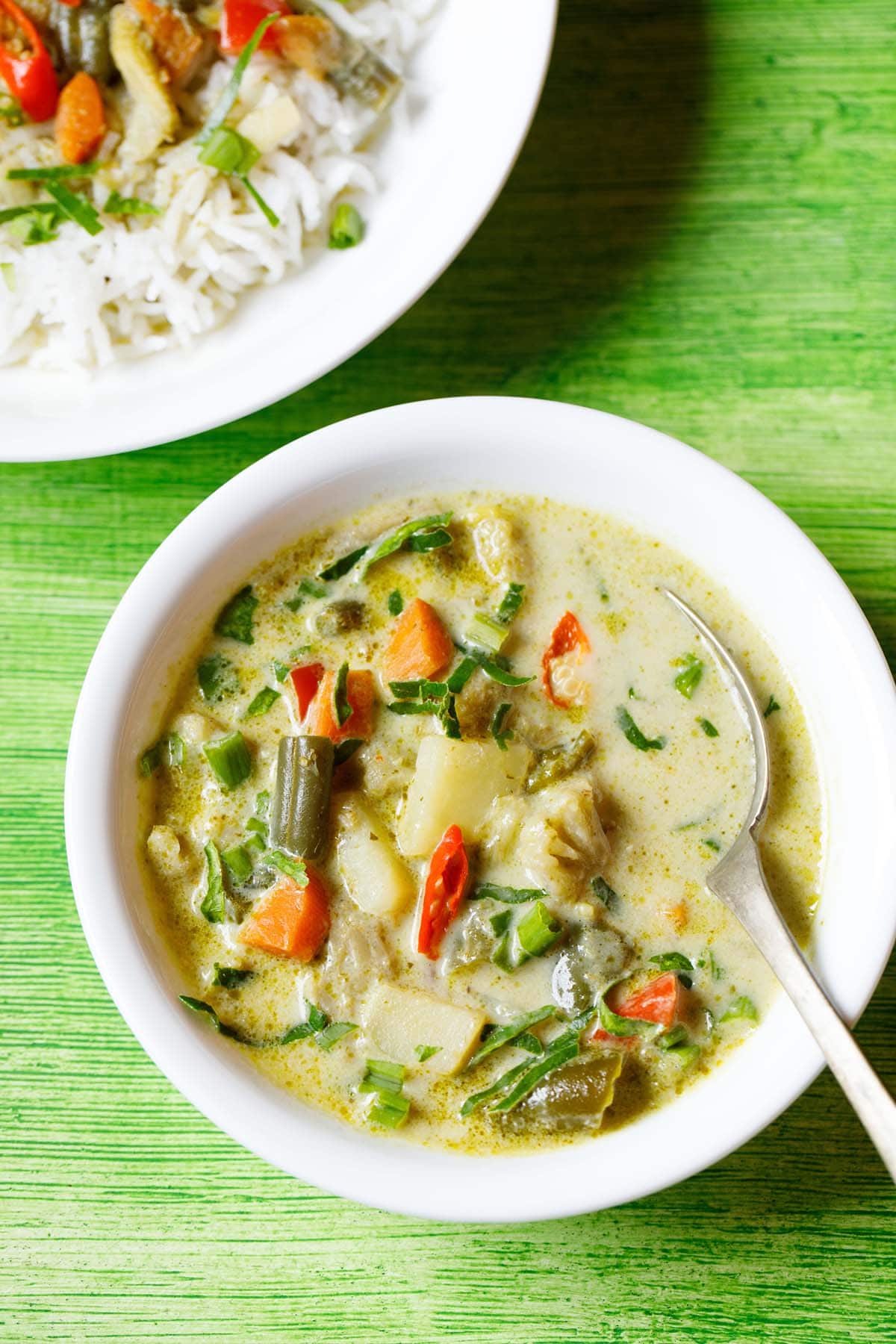
How to make Thai Green Curry
First we need to prepare the green curry paste. So prep and set aside all the herbs and spices you will need to make the curry paste.
Rinse the herbs a few times with water. Drain the water and set the herbs aside.
My green curry paste is easily scaleable. I make a large batch of it usually and freeze it. Obviously having the green curry paste handy makes it easier and quick for the curry to come together.
Make Thai Green Curry Paste
1. Add the following chopped ingredients in a small mixer-grinder or a small blender:
- 2 to 3 small Thai red chilies or bird’s eye chillies
- 1 green chili or 1 teaspoon chopped green chillies
- ½ cup coriander leaves (cilantro)
- ¼ cup chopped shallots or onions or pearl onions
- 1 inch galangal, peeled and roughly chopped
- 2 to 3 garlic cloves, small-sized, peeled and chopped
- 2 stalks of lemongrass, chopped
- 2 to 3 medium-sized kaffir lime leaves, torn
- 2 teaspoons coriander seeds
- 1 teaspoon cumin seeds
- ¼ teaspoon lemon zest
- 1 teaspoon soy sauce, naturally brewed
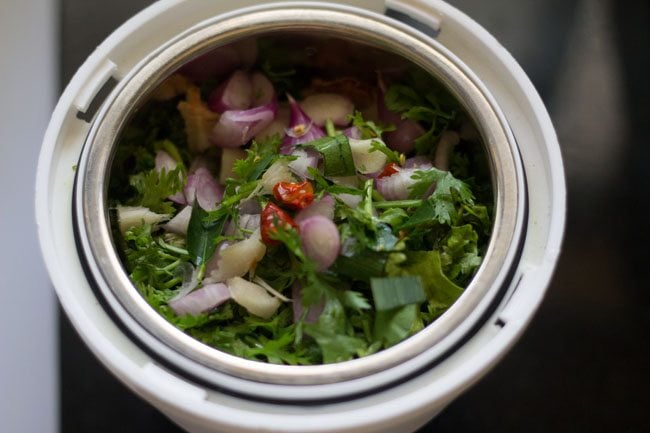
2. Grind these ingredients into a semi-fine or fine paste, without adding water. If the mixture is too dry and not becoming a paste, then only add a bit of water and grind again. Set the green curry paste aside.
You can also make the green curry paste adding 3 tablespoons coconut milk instead of the 1 teaspoon soy sauce.
Rinse and prep all the veggies that you will be adding to the curry. You can add your choice of veggies. But keep in mind their cooking times as you don’t want the veggies to be a mush.
Prep, measure and set the following veggies aside:
- ¼ cup chopped french beans
- ¼ to ⅓ cup chopped bell pepper/capsicum – add any colored bell pepper
- ⅓ cup chopped baby corn
- ½ cup peeled and chopped potatoes
- ⅓ to ½ cup chopped carrots
- 1 cup chopped button mushrooms
- 1 cup chopped cauliflower or broccoli florets
- 7 to 8 Thai pea eggplant (turkey berry), optional
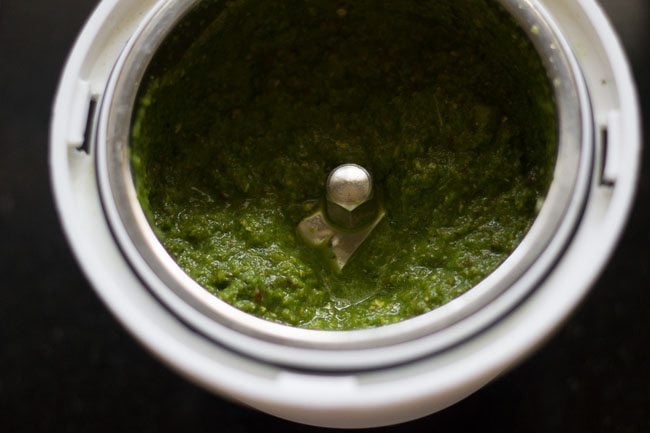
Cook Vegetables
3. Next, heat 2 tablespoons of coconut oil or sesame oil in a pan over medium-low to medium heat. Add the green curry paste. Sauté the green curry paste for 1 minute.
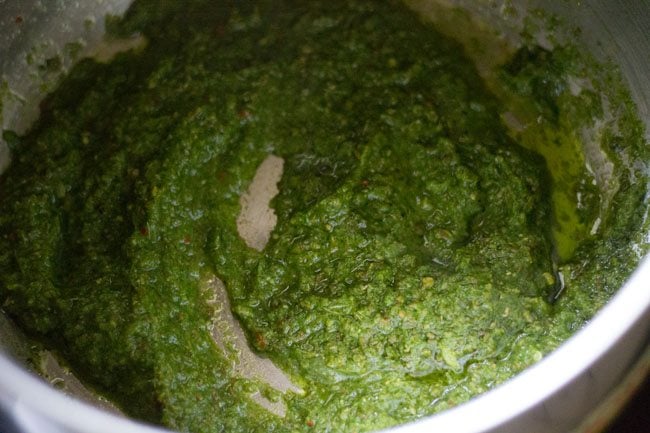
4. Then add all of the chopped and prepared veggies. Feel free to add any vegetables you like!
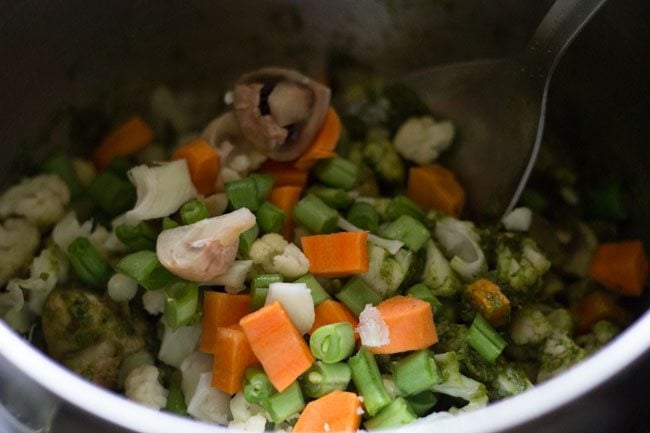
5. Add 2 cups of water and mix well. To make a thick curry, add less water but make sure that the veggies are cooked in this much water.
For a more spicy curry, you can add about 1 to 2 sliced or chopped bird’s eye chillies or small Thai red chillies at this point.
2 to 3 chopped or torn Kaffir lime leaves, a few pieces of chopped galangal and some chopped lemon grass stalks can be added at this step. But note that while serving you will have to fish out these herbs.
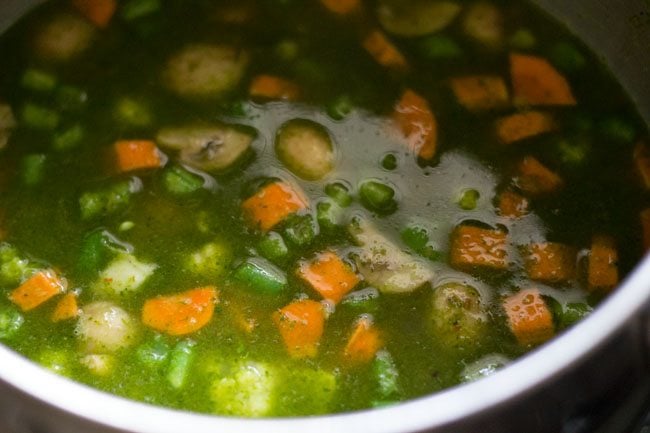
6. Cover and cook, stirring occasionally, until the veggies are almost done. Be sure to not overcook the veggies.
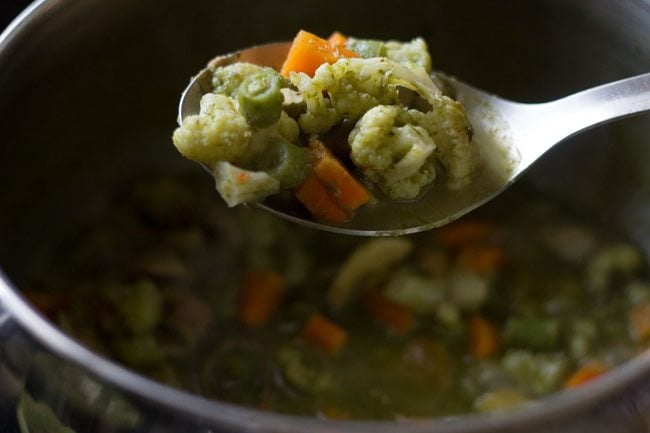
Make Thai Green Curry
7. Now add 1 cup of coconut milk, and stir well to combine. Taste and add salt as needed.
For a thicker consistency, add some more coconut milk.
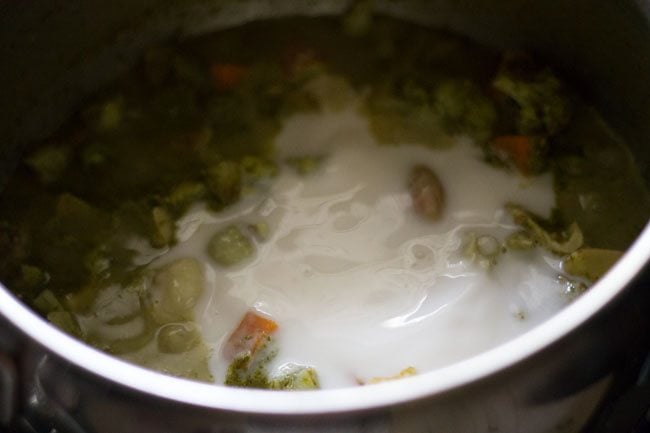
8. Then bring the curry to a gentle simmer on low to medium-low heat. Remember not to boil the curry as the coconut milk can separate.
Gently simmer the green curry on a low to medium-low heat after adding the coconut milk. Lastly add 2 tablespoons of chopped Thai basil leaves and stir to mix. Switch off the heat.
If you prefer, you can add ½ to 1 teaspoon palm sugar at this point.
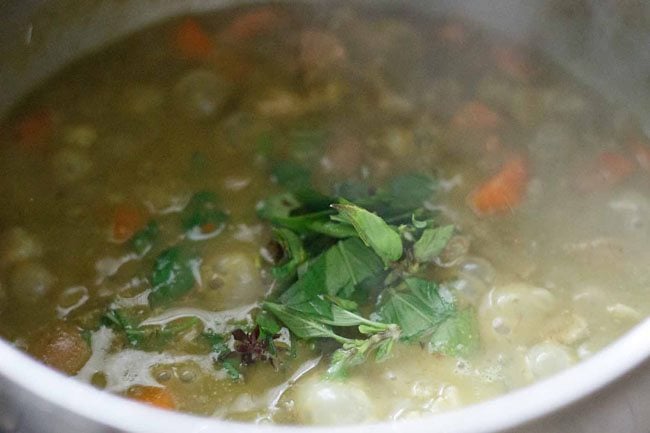
9. Serve the Thai Green Curry with warm lemongrass rice, plain jasmine rice, or steamed basmati rice. You can also enjoy the curry with some boiled noodles.
While serving garnish with spring onion greens, chopped Thai basil or cilantro. For a spicy touch, top with a few slices of Thai red chillies.
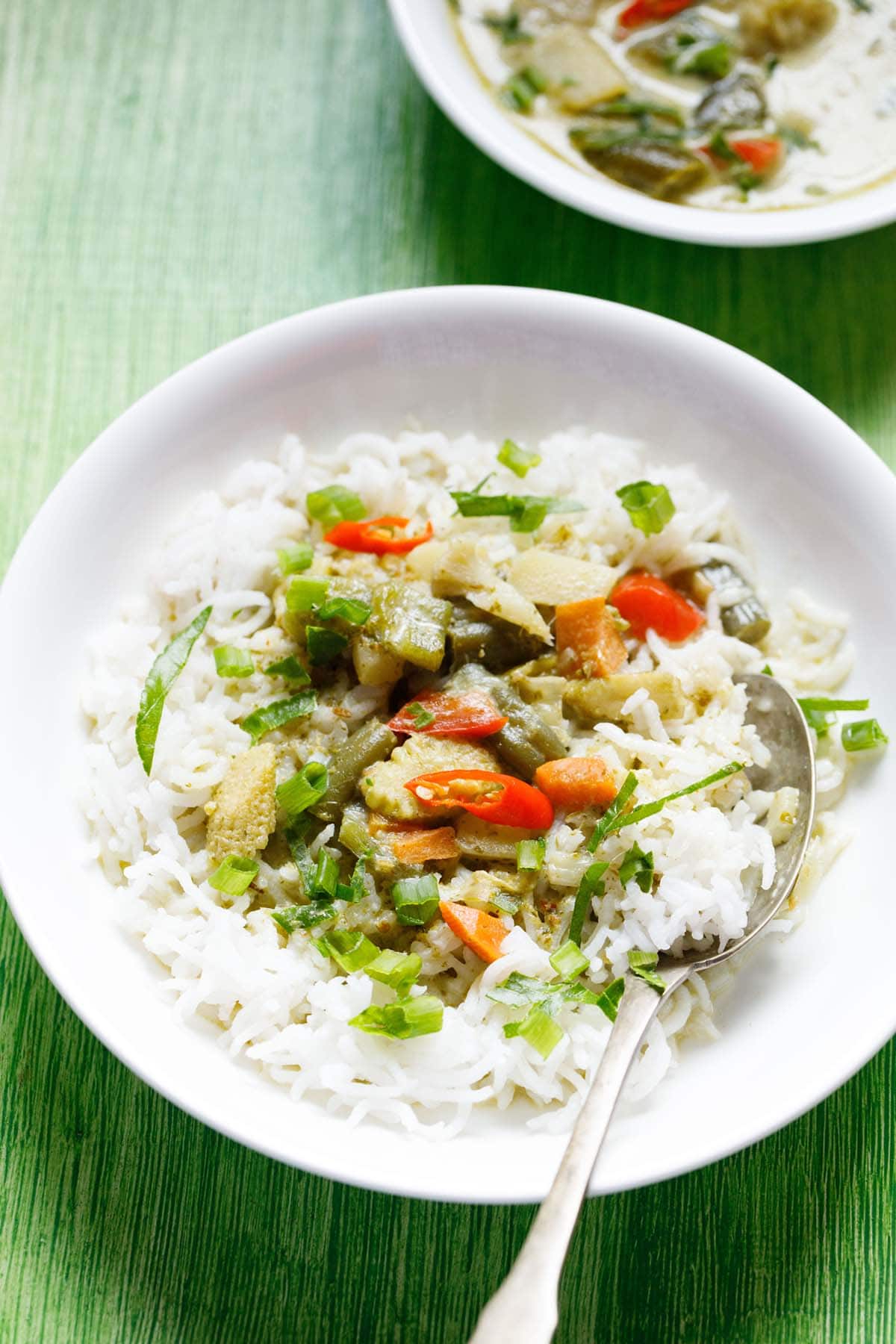
Thai Green Curry – Expert Tips & Variations
Before you get started I suggest you check out a few recipe variations and some of my foolproof tips for how to make the best Thai veg green curry from scratch:
- Thai Herbs and Spices Swaps: I suggest that you use Thai herbs and spices as listed in the full recipe below. However, should you not quite have everything, there are several ingredients swaps you can make with other popular pantry items:
- Galangal: use ginger instead
- Kaffir lime leaves: add lemon zest instead
- Thai chillies: substitute green chillies
- Pearl onions or shallots: use small onions instead
- For lemon grass: I do not think there is any substitute. You can use lemon zest, but note that it will not have the same vibrant flavor as traditional lemon grass.
- Cilantro: Alternatively, you can also grind in some coriander roots or stems (cilantro root or stems) to add a bit of fresh flavor.
- Thai Basil: You could swap Thai basil with the Italian basil. Though both have different flavor profiles, but Italian basil can be added instead.
- Choose your own choice of vegetables: I include carrots, green beans, baby corn, capsicum, cauliflower and potatoes. But feel free to use other veggies like broccoli, zucchini, mushrooms, etc directly to the curry while cooking (no need to boil these beforehand).
- More Protein: Add some healthy protein to this plant-based dish by including chunks of extra firm tofu.
- Soy Sauce: Instead of soy sauce, you can use tamari or coconut aminos.
- Consistency: Adjust the consistency of the curry to your liking. I prefer slightly thin curries, so I added a bit more water. Use less and your curry will be thicker.
- Liquids: Easily add homemade vegetable broth instead of water. For a thicker consistency add a bit of coconut milk.
- This Thai green curry is spicy: However, if you like very spicy food, you can increase the heat by adding a few more chilies. Want a version that is slightly milder? Use only 1 small Thai green chili.
- Scaling: Double or tripe the recipe to make a large batch of green curry paste. Store unused portions in an airtight container and keep in the freezer for up to 3 months.
- Serving Suggestions: Enjoy homemade green curry with a side of jasmine or basmati rice. Or serve with the curry directly on top of the rice!
More Thai Recipes To Try!
Rice Recipes
Thai Recipes
Soup Recipes
Soup Recipes
Please be sure to rate the recipe in the recipe card or leave a comment below if you have made it. For more vegetarian inspirations, Sign Up for my emails or follow me on Instagram, Youtube, Facebook, Pinterest or Twitter.
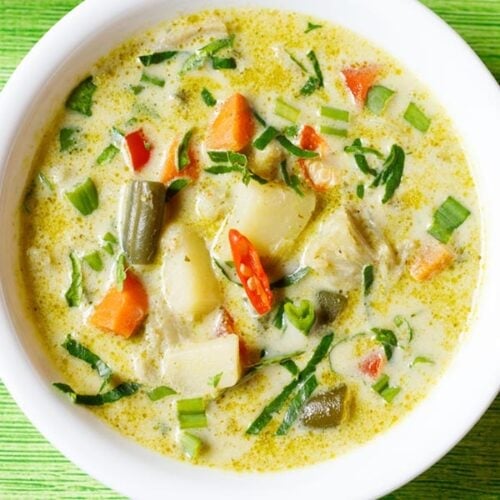
Easy Thai Green Curry with Vegetables
Ingredients
For Green Curry Paste
- 2 to 3 Thai chillies red colored and small-sized or 2 to 3 bird's eye chillies
- 1 green chilli or 1 teaspoon chopped green chillies
- 1 inch galangal – peeled and chopped (substitute is ginger)
- 2 to 3 garlic cloves – small-sized, peeled and chopped
- ¼ cup chopped shallots or pearl onions or onions
- ½ cup coriander leaves (cilantro)
- 2 to 3 kaffir lime leaves – medium-sized or 4 to 5 small kaffir lime leaves
- 2 lemon grass stalks – chopped
- 2 teaspoon coriander seeds
- 1 teaspoon cumin seeds
- 1 teaspoon soy sauce – naturally brewed
- ¼ teaspoon lemon zest (grated rind of lemon), optional
- 3 tablespoons Coconut Milk – optional
For Thai green curry
- 2 tablespoons coconut oil or sesame oil
- 2 cups water
- 1 cup Coconut Milk (Thick) – fresh homemade or canned
- sea salt or regular salt, as required
- 2 tablespoons thai basil leaves – chopped
Vegetables
- ¼ cup chopped french beans
- ¼ to ⅓ cup chopped bell pepper or capsicum – add any colored bell pepper
- ⅓ cup chopped baby corn
- ⅓ to ½ cup chopped carrots
- ½ cup chopped potatoes
- ½ cup chopped button mushrooms
- 1 cup chopped cauliflower or broccoli florets
- 7 to 8 Thai pea eggplant (turkey berry), optional
Instructions
Making Thai green curry paste
- Take the following chopped ingredients in a mixer-grinder jar or a small blender – thai red chilies, green chili, coriander leaves, soy sauce, shallots, galangal, lemon grass, kaffir lime leaves, coriander seeds, cumin seeds and lemon zest.
- Grind these ingredients to a semi-fine or fine paste without adding water.
- If the mixture is too dry and not getting ground, then add a few tablespoons of water and grind the curry paste ingredients. You could also grind it with some coconut milk instead of soy sauce. I won't recommend grinding the paste in a mortar and pestle as its too much of hand work .
- Grind to a semi-fine or fine paste. The curry paste made with this recipe is perfect for the this thai curry recipe.
Making thai green curry
- In a pan, heat coconut oil or sesame oil. Gently heat the oil on a medium-low heat.
- Add the green curry paste. Sauté the paste for 1 minute on low to medium-low heat.
- Add all the chopped mix vegetables. You can add your choice of veggies.
- Add 2 cups of water and mix well.
- Cover and cook till the veggies are almost done. But don’t overcook the veggies.
- Add the thick coconut milk and mix it thoroughly.
- Also add salt as required. Mix again very well.
- Bring the entire curry to a gentle simmer on a low to medium-low heat. Lastly add some chopped Thai basil leaves. Stir to mix and switch off heat.
- Serve the Thai Green Curry hot with steamed jasmine rice or basmati rice. While serving garnish the green curry with some chopped spring onion greens or Thai basil or a few sliced Thai red chillies.
Notes
Ingredients Swaps
- Spices and Herbs: The taste and flavor of an authentic Thai Green Curry comes from using the special and unique Thai herbs and spices. If you cannot source these, there are some everyday herbs and spices that you can include, but the taste and flavor of the curry changes and is not quite like the traditionally made Thai red curry.
-
- Galangal: you can add ginger instead
- Kaffir lime leaves: add some more lemon zest or use regular lemon or lime leaves.
- Thai chillies: swap with green chillies
- Pearl onions or shallots: use small onions instead
- For lemon grass: There is no substitute. But you can use lemon zest, but note that it will not have the same vibrant flavor as traditional lemon grass.
- Cilantro: Instead of cilantro leaves, you can also blend or grind in some coriander roots (cilantro roots) or stems to add a bit of fresh flavor.
- Thai Basil: You could swap Thai basil with the Italian basil. Even though both have different flavor profiles, but Italian basil can be used instead.
- Vegetables: Add your favorite veggies. I like to include carrots, green beans, baby corn, bell pepper, cauliflower and potatoes. But feel free to use other veggies like broccoli, zucchini, mushrooms, etc or the ones which you like.
- Soy Sauce: Instead of soy sauce, you can use tamari or coconut aminos or Bragg’s liquid aminos.
Recipe Notes
- More Protein: Add some healthy plant based protein to the curry by including cubes or chunks of extra firm tofu.
- Consistency: Adjust the consistency of the curry to your liking. I prefer slightly thin curries, so I add a bit more water. Use less and your curry will be thicker.
- Liquids: Easily add homemade vegetable broth instead of water. For a thicker consistency add a bit of coconut milk.
- Spiciness: If you like very spicy food, you can increase the heat by adding a few more chilies. For a slightly milder use only 1 small Thai green chili or 1 bird’s eye chilli.
- Scaling: You can double or triple only the green curry paste recipe to make a large batch of green curry paste. Store unused portions in an airtight container and keep in the freezer for up to 3 months.
Nutrition Info (Approximate Values)
This Thai Green Curry recipe post from the archives first published in October 2010 has been updated and republished on 2 September 2022.


